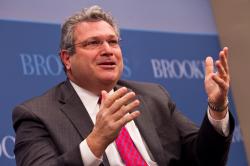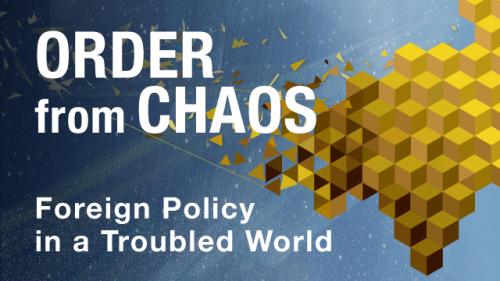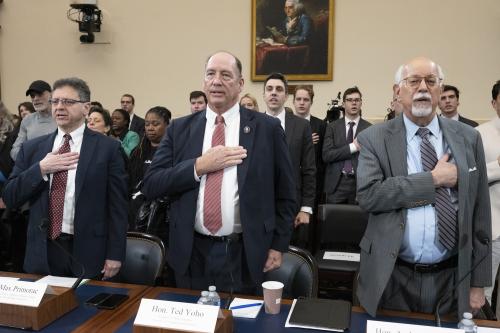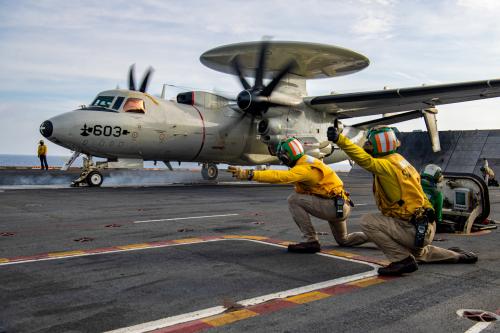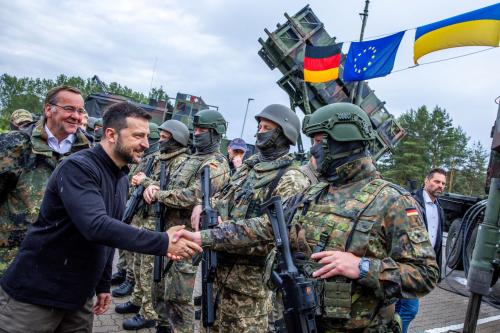Since early 2015, the Brookings Order from Chaos Task Force has convened Republican and Democratic foreign policy experts to draft “Building ‘Situations of Strength,’” which outlines a U.S. policy for a period of geopolitical competition. This multi-year initiative joined Brookings’s Martin Indyk, Bruce Jones, Robert Kagan, and Thomas Wright with Derek Chollet, Eric Edelman, Michèle Flournoy, Stephen Hadley, Kristen Silverberg, and Jake Sullivan. Brookings’s Order from Chaos project is designed to provide analysis and policy recommendations for defending and reforming the international order for the 21st century.
 Since the late 1940s, in the wake of World War II, the centerpiece of U.S. grand strategy has been to build and lead an international order composed of security alliances, international institutions, and economic openness, to advance the causes of freedom, prosperity, and peace. In 2016, for the first time, the American people elected a president who was highly critical of this international order and its constituent parts. This did not come out of the blue. Anxieties about globalization and America’s role in the world have been brewing for some time. Americans now face a consequential choice—to continue to lead and shape the postwar order or to leave it behind.
Since the late 1940s, in the wake of World War II, the centerpiece of U.S. grand strategy has been to build and lead an international order composed of security alliances, international institutions, and economic openness, to advance the causes of freedom, prosperity, and peace. In 2016, for the first time, the American people elected a president who was highly critical of this international order and its constituent parts. This did not come out of the blue. Anxieties about globalization and America’s role in the world have been brewing for some time. Americans now face a consequential choice—to continue to lead and shape the postwar order or to leave it behind.
World politics took a sharp turn for the worse over the past five years as two decades of great power cooperation gave way to a new era of geopolitical competition. To succeed in the coming decades, the United States needs a strategy that begins with the setting of a clear goal: the renovation and reinvigoration of the postwar international order. We believe that President Donald Trump should take a leaf from President Harry Truman’s Secretary of State Dean Acheson, who argued that the United States should build “situations of strength” around the world with like-minded nations and work with them to tackle the threats and challenges to U.S. interests.
Why the International Order Appears to be Unraveling
We are in the early years of the third phase of the U.S.-led international order. The first phase lasted the duration of the Cold War from 1945 to 1989 and was defined by U.S.-Soviet rivalry. The second phase was the roughly twenty-year period after the fall of the Berlin Wall in 1989 and was characterized by relative cooperation among the world’s major powers and transnational threats. The third phase is marked by four trends.
- The world is becoming more geopolitically competitive with great power challenges to U.S. leadership in East Asia and Europe.
- Chaos in the Middle East is highly infectious and spreading disorder in the region and beyond.
- Technology is having an increasingly disruptive effect.
- Western dissatisfaction with the status quo has sapped the appetite for internationalism in the United States and Europe.
In the 1990s and 2000s, the positive elements of international order were mutually reinforcing. Now, they have gone into reverse and contribute to instability and disorder. This is a very different world than the one that presidents inherited in 1993, 2001, or 2009.
Interests and Intentions
In a more geopolitically competitive world, the intentions and ambitions of other countries are particularly important.
Vladimir Putin’s vision of international order is fundamentally at odds with the interests of the United States. Putin believes that the U.S.-led postwar order weakens his hold on power and denies Russia the regional and global influence it deserves. He has made it his mission to weaken this order. Putin would replace it with spheres of influence in which major powers are preeminent in their respective regions and they all have a roughly equal say on matters of global importance. Russia will act unilaterally to defend its interests and to gain leverage over the West, including by means of military intervention; active measures against Western democracies; greater reliance on Russia’s nuclear arsenal; and cyber-warfare.
The Chinese leadership has a more complex and multi-faceted view of the international order than Putin, largely because it benefits from the international economic order. However, China is seeking preeminence in East Asia and a weakening of the U.S. alliance system, and it is employing gradualist tactics to unilaterally change the status quo, particularly in the maritime domain. If China succeeds, it would likely dramatically weaken the rules-based character of the international order, undermine the U.S. position globally, and ensure that the geopolitics of East Asia is inherently unstable.
Most other nations define their interests in a way that is more compatible with the traditional U.S. vision than with Russia or China. While many nations have issues or problems with U.S. foreign policy, there is little desire to overturn the existing international order or for reducing America’s global role.
Beset by crises, America’s European allies have become more inwardly focused but they remain committed to the postwar order and are supportive of U.S. leadership. America’s East Asian allies and partners presently all want greater U.S. engagement but they are very reluctant to be drawn into an endeavor that could be seen as containing or confronting China. America’s Middle Eastern allies—Israel, Egypt, Saudi Arabia, Jordan, Morocco, and the United Arab Emirates—all want greater U.S. engagement in the their region. The emerging powers—India, Brazil, Indonesia, and others—want a global order that is more inclusive and less Western.
Toward a Strategy
The United States must adjust its strategy to account for the fact that the world is more geopolitically competitive, that the Middle East regional order is collapsing, and that many citizens—in the United States and overseas—question whether an open global economy can ever deliver on its promise. The Trump administration should continue to define U.S. interests broadly and it should seek to renovate and reform the postwar international order.
America’s most pressing challenge is to devise a set of integrated regional strategies, which must be guided by eight principles:
- Understand the competitive nature of the challenge.
- Restore trust with allies.
- Deter revisionism that threatens the international order.
- Distinguish between revisionism and legitimate aspirations.
- Create and deploy leverage in U.S. diplomacy.
- Deal with the most imminent direct threats to America: Islamist terrorism, North Korea.
- Develop strategies that are resilient against uncertainty and share a common purpose.
- Recognize that climate change is a geopolitical issue.
One of the U.S. administration’s strategic objectives must be to create a new and favorable equilibrium across all these regions and domains. This will, by necessity, require an assertive and unyielding posture in some areas along with a prudent recognition that, at times, adjustments and compromises need to be made. This begs the question, how much should the Trump administration hold the line, how much should it change the existing order, and how much should it accommodate dissatisfied powers?
The United States should adopt an uncompromising position on any issue or dispute in which a rival power uses force, the threat of force, or roughly equivalent means of coercion (cyberattacks, covert operations, political subversion) to undermine, coerce, or invade its neighbors. The United States will not be able to stop every act of aggression by a rival power, but it can significantly raise the costs of such aggression and frustrate whatever strategic goal the aggression was intended to achieve. America must not send the message that the future will be shaped by those countries who can muster the will and military might to challenge the international order.
The United States should take a more flexible approach to issues or disputes where force and coercion are taken off the table. If other countries want to change the system by persuading other nations and people that it is not in their interests, then they are free to do so. The United States should make its case as powerfully as possible, but it must accept and respect the right of others to advocate for change. In those cases, the United States should ask if there is a way to accommodate their demands while maintaining the core principles and benefits of the international order.
Regional Applications
Europe
A strong and prosperous Europe that supports and strengthens a renovated and revitalized international order is in America’s immediate and long-term interests. The United States should reaffirm its commitment to NATO and its support for the European Union. It should support completing integration in those areas, primarily economic, where the EU remains exposed to external crises. The United States also has an interest in Brexit negotiations producing a strong and successful independent Britain engaging constructively with a strong and successful European Union. The United States should seek to revitalize transatlantic trade by negotiating an economic agreement with the EU that addresses some of the real shared concerns about the global economy, including cybersecurity, lessons learned from sanction regimes, resisting state-sponsored distortions to the market, and energy issues.
In Europe, the United States must block and deter Russian aggression wherever it violates the principles of the international order and thereby impinges on our interests and those of our friends and allies. Once deterrence has been reestablished and the parameters of a new equilibrium are clear, the United States should be willing to negotiate a modus vivendi with Moscow that respects Russia’s interests and those of the United States and our European allies
and partners consistent with the principles of the international order.
Asia-Pacific
The foundations of U.S. strategy in Asia historically have been alliances and a forward U.S. military presence, free trade, open institutions, and support for democracy. This strategy is now principally challenged by China’s assertiveness and revisionism. To preserve the international order in East Asia, the United States must prevent China from establishing control over an expanded sphere of influence in the Western Pacific. However, the United States must also make it clear that China has a hugely important role to play in our vision of regional order in East Asia. It can play this role in the institutional structure of the region and its many multilateral forums, some of which will require reform. The United States can also work with China as it increases its
engagement to its west, particularly through initiatives like “One Belt, One Road.”
The United States must also comprehensively engage its allies—economically as well as in the security realm—and deepen its ties with India. The United States must also enhance deterrence against a gathering threat from North Korea and develop options to prevent it from acquiring a ballistic missile capability that can threaten the American homeland.
Middle East
In the Middle East, America’s first goal must be to restore stability in the region through increasing engagement with our traditional friends and allies and restoring trust where necessary. The United States should prioritize economic reform and modernization to create the conditions for progress in the Arab world. The United States must balance Iran and deter it from aggressive actions that threaten stability, international order, and our vital interests or those of our allies. The goal of this balancing should be to change Iranian behavior, which would allow for engagement on regional security issues. The Trump administration needs to ensure that the nuclear agreement with Iran—the Joint Comprehensive Plan of Action (JCPOA)—is strictly enforced and that the Iranian leadership understands that the international community will never accept an Iran with a nuclear weapons capability. In Syria and Iraq, the Trump administration should pursue the defeat of ISIS to the end but it must also prepare for the day after. In Syria, that means increasing U.S. leverage vis-à-vis Russia and Bashar al-Assad, and takings steps to prevent Iran from emerging as the big winner from the war. In Iraq, the Sunni communities in liberated areas will need to be protected by the Iraqi government and more equitable power-sharing arrangements and revenue distributions will need to be promoted.
Implementation
The United States must implement this strategy using its military, diplomatic, and economic power. Specific steps include the following:
Military Power
- Preserve a preponderance of power and America’s military edge.
- End the 2011 Budget Control Act caps and the threat of sequestration.
- Strengthen and modernize U.S. alliance capacity.
- Update deterrence by enhancing the credibility of existing U.S. security commitments and developing proportionate responses to aggression against non-allied governments.
- Inch toward a cyber equilibrium by building credible expectations among allies, rivals, and non-state actors as to U.S. offensive and defensive capacity, and the magnitude of an American retaliatory action for certain offenses.
- Modernize the U.S. nuclear arsenal and supporting nuclear infrastructure and reassure our allies of the continued U.S. commitment to extended deterrence.
Diplomatic Power
- Build “situations of strength” with allies and partners before negotiating with rivals.
- Reaffirm U.S. interests and commitments, particularly to allies and partners.
- Embrace both new and old multilateral platforms for shared problems.
- Gain support of allies for coercive diplomacy.
- Maintain values of democracy and human rights in U.S. diplomacy.
Economic Power
- Expect and prepare for a new international financial crisis.
- Recognize that a strong national economy requires a strong global economy.
- Make economic diplomacy more ambitious by tackling the numerous fault-lines and problems in the global economy that directly and detrimentally impact the United States and American workers.
- Leverage economic power responsibly by using sanctions in response to exceptional acts of aggression or illegality, by seeking multilateral support, and by keeping in mind the U.S. interest in an open global economy.
- Make economic decisions that take into account the necessity of maintaining America’s competitive advantage and national security needs in the coming decades.
The Brookings Institution is committed to quality, independence, and impact.
We are supported by a diverse array of funders. In line with our values and policies, each Brookings publication represents the sole views of its author(s).






